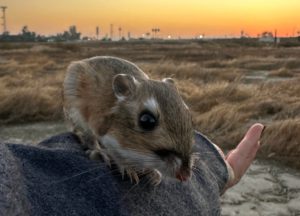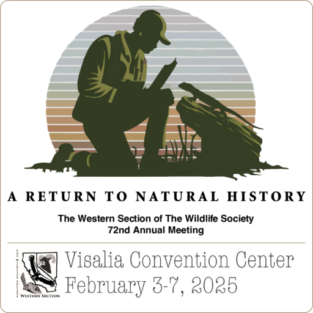Small Mammal Symposium
- Two days! Monday & Tuesday, February 3-4, 2025. Visalia, CA.
- Monday, 1:00pm to 5:30pm AND Tuesday, 8:30am to 5:00pm (Start time moved to 8:30am!)
- Requires separate registration fee. Link to rates
- The Small Mammal Symposium is a stand-alone event so you can register for it on its own.
- Link to Draft Agenda
- Chairs: Brock Ortega, Dudek and Ashleigh Pryor, McCormick Biological
Come join us for  the Small Mammal symposium preceding the 72nd Annual Meeting. This symposium is planned to cover all listed California small mammals from our gang of kangaroo rats to the diminutive but deadly Buena Vista Lake ornate shrew. Our list of presenters is under development but is sure to include a name or two that you all know. For each species, we intend to provide a brief description of their life history, current known distribution, and known population status. There is always new information coming from biologists who work on these species and there is sure to be some new technique or other nugget that you will want to hear first-hand. Don’t let your competitor hear it first!
the Small Mammal symposium preceding the 72nd Annual Meeting. This symposium is planned to cover all listed California small mammals from our gang of kangaroo rats to the diminutive but deadly Buena Vista Lake ornate shrew. Our list of presenters is under development but is sure to include a name or two that you all know. For each species, we intend to provide a brief description of their life history, current known distribution, and known population status. There is always new information coming from biologists who work on these species and there is sure to be some new technique or other nugget that you will want to hear first-hand. Don’t let your competitor hear it first!
Sponsored by H.B. Sherman Traps, Inc — Thank You!



 Training for High Speed Rail Jobs
Training for High Speed Rail Jobs
- Tuesday, February 4, 2025 – 1:00 to 5:00pm
- In-Person in Visalia, CA
- Requires separate registration fee. Link to rates
- Moderator: Debra Hawk, California High Speed Rail Authority
Wildlife Biologist Construction Awareness Training (WildC.A.T.)
- Tuesday, February 4, 2025 – 8:30pm-12:30pm
- In-Person in Visalia, CA
- Requires separate registration fee. Link to rates
- Moderator: Natalie Greer, Stantec
Wildlife biologists are often called on to provide technical expertise and implement protective measures on construction sites, but they rarely receive practical training in environmental permits or safety as they enter the workforce. This half-day workshop provides an introduction to construction monitoring for recent graduates, early career professionals, and regular construction monitors, and will be taught by experienced wildlife biologists, construction personnel, and health and safety officers.
Learn about the environmental permits that require construction monitoring, what to expect on construction job sites, situational awareness and health and safety basics, common environmental protection issues and Best Management Practices, effective communication techniques with construction crews, and useful tools of the trade. Upon completion of the workshop, attendees will receive a certificate of completion and helmet sticker that shows prospective employers and construction personnel in the field that they have attended WildC.A.T. training.

CyberTracker One-day Certification
- Two days!
- Friday, February 7, 2025 – 1:30pm to 2:30pm: Introduction to CyberTracker Certification (free, no RSVP required)
- Saturday, February 8, 2025 – 8:00am to 2:00pm: CyberTracker One-Day Certification (*Extra Fee, Registration Required)
- In-Person in Visalia, CA.
- Saturday One-Day Certification requires separate registration fee. Link to rates
- Chair: Casey McFarland, CyberTracker Conservation
Well-rounded field skills and ecological literacy were once common among field biologists and emphasized in university curricula. In recent decades, however, these qualities and practices have rapidly diminished; numerous academic articles have highlighted this loss, warning of the impacts on future research, wildlife management, and conservation.
There are two ways to learn about Wildlife Tracking in Visalia!
(1) Introduction to Wildlife Tracking – Friday, February 7 from 1:30-2:30pm. All attendees receive a free Tracker Certification North American ruler! Free and no RSVP required. Continuing on the Annual Meeting theme, this short presentation will discuss why wildlife tracking and CyberTracker Certifications have proven to so effectively revive essential field skills and natural history knowledge among biologists, employees of State and Federal agencies, National Park staff, conservationists, wildlife guides, and the general population alike.
(2) One-Day Certification with CyberTracker Conservation– Saturday, February 8 from 8:00am to 2:00pm. This event requires advance registration and has an *extra fee. Limited to the first 20 registrants. The CyberTracker Certification process facilitates an ability to interpret the tracks, sign, behavior, and ecological relationships of wildlife present on any landscape. Participants will spend the day testing their ability to identify and interpret tracks and sign in the field. The process is designed to give each participant the opportunity to personally investigate and identify each track or sign found before the group discusses it at length; this creates intensive levels of concentration, balanced by open, fun, and entertaining discussions that engage the group in an unforgettable exploration of wildlife behavior and ecology. No prior experience is required to participate.
Casey McFarland trains biologists, research teams, wildlife guides, and the public to read and interpret the tracks and signs of wildlife. A Senior Tracker and International Evaluator for CyberTracker Conservation, he has given over 180 Tracker Certifications and various trainings around the globe to develop and support tracking skill and ecological knowledge. Casey has authored several books and is the Executive Director of Tracker Certification North America.
If you have suggestions for topics you’d like to see in the future, please email Janine Payne at pdc@tws-west.org.

